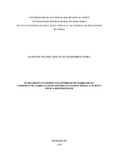Fundamento filosófico da interdisciplinaridade no componente curricular de história no ensino médio: o sujeito em sua historicidade

Data
2019-05-09Autor
GOMES, Raimundo Wagner Gonçalves de Medeiros
http://lattes.cnpq.br/0298204751445773
Metadado
Mostrar registro completoResumo
Considering that a) teaching, as a pedagogical activity, is configured as a more complex
than the common tradition of linear exposition of the theoretical Sciences; b) that the center of
the school process is the subject in its formation for citizenship; c) that the teaching-learning
process can not dispense with interdisciplinarity as ground; d) that the conduct of the teachinglearning process is based on the contradiction between the solipsism of the subject and the
complexity of the real the understanding of the role of the curriculum will become transparent
and, its exercise, soberly practicable. Before the question: how does interdisciplinarity, based
on the epistemological structure of the subject, contributes to a construction (teaching) of the
history discipline in High School? For the elucidation of the question, it is aimed, taking as
background the teaching of the discipline of history: 1) to show the structure of the subject in
the light of philosophy (subject epistemological) and of historical science (historical subject)
mediated by the geography (spatial subject ) and sociology (post-structural subjects) -
disciplines present in the curriculum of human sciences of High School; 2) demonstrate the
preeminence of interdisciplinarity as an epistemological condition inherent in the teachinglearning; 3) discuss the curriculum as a place of conflict and as a dialectical result between the
subject and socially constituted knowledge and as a place of access to the consciousness of his
condition and epistemological constitution of author of knowledge. The methodology used to
achieve the listed goals is a bibliographical research aimed at clarifying what is the idea of
subject; to prove it as the foundation of the discipline of history and that, with understanding of
this pre-eminence, the pertinence of the pedagogical role of this curricular component in the
achievement of the objectives assigned to High School. To this end, the dialectical-historical
method, according to Marx (2001, 2008), is used, since the construction of human
consciousness is grounded in its historical-material relations. Thus, together with Heidegger's
phenomenological-hermeneutic method (2000), once human actions are directly conditioned to
the interpretation of reality and, for this reason, reason, the deeper this interpretation enters into
the truth of being, the better apprehension of the world in its truth (contextual, procedural). In
this way, it has been found in this research that the state of knowledge in the approach of
teaching history, is perceived as neglecting the ontological nature of the man, subject
autonomous interpreter, although conditioned, developing exposures that touch the surface of
the problem without going into its heart. Thus, it can be concluded that researches aimed at
teaching (here, specifically, the teaching of history) can not dispense with a hermeneutics that
reveals the ontological conditions that underlie the historical-social context of the subject - the center of the educational process - for understanding the this type of reflection has in the
comprehension of the amplitude of the gnosiological spectrum of the student, so that the
teaching activity, based on this perception, develop the competences to get the stimulus of
creative curiosity in the pedagogical process towards a gnosiological and epistemological
necessary for the development of the intellectual autonomy, that is a preamble to ethical
autonomy and, consequently, politics in citizen praxis.



